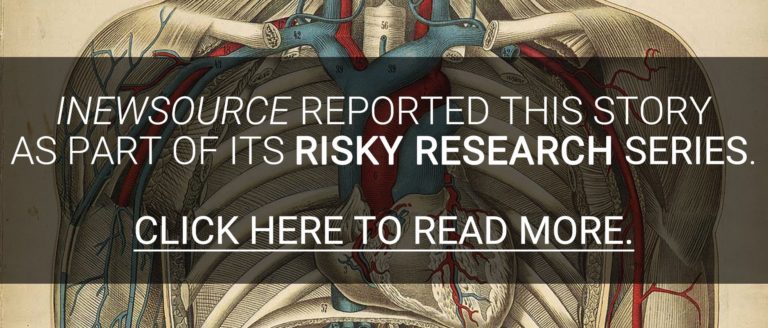1990s Unethical Experiments at Prestigious Academic Institutions
1993 Kathryn Hamilton died 44 days after being enrolled in Protocol 681 at the Hutchinson Cancer Center in Seattle
Siix days later, Hamilton’s doctors submitted the journal article documenting what they had known for more than a year: The primary rescue drug didn’t work. Read “Unnformed Consent,” a monumental five-part investigative series by Duff Wilson and David Heath in the Seattle Times (2001) providing detailed facts about the experiment, demonstrating how financial conflicts of interest undermine the safety of human subjects in clinical trials—indeed, those conflicts put the subjects at high risk of death. None of the patients in Protocol 126—an experiment that involved bone marrow transplants and eight experimental monoclonal antibodies—had been informed about the risks.
Even as the failures and deaths mounted, and Protocol 126 was altered again and again, patients being enrolled in the trial were not informed about the known and foreseeable risks involved – as required by U.S. regulations. They were they informed about a failed prior trial in dogs who died; nor were patients informed about the risks should the transplant fail. The death toll mounted during 12 years, but the patients in the trial were kept ignorant, nor were they informed about the financial interest that the Hutch and several of its doctors had in the experimental drugs being tested. The tragedy was even greater inasmuch as there were safer, more effective alternative treatments available, but patients were not informed about these alternatives.
“the potential for profit was not as clear-cut in this instance. In fact, this experiment continued long beyond the point where any money could be made from it. The trial appears to have taken on a life of its own, being completed for completion’s sake rather than for meaningful science or for the benefit of patients. The complete findings of the study were never even published.”
“after Hamilton and the first victim died from high-dose chemotherapy, the researchers persisted – actually increasing the doses they gave other women. Oncologists, ethicists and drug-development experts said such a decision would be extraordinary. Some said they had never heard of a clinical trial in which doses were increased after a patient had died from the drugs.
“I can’t imagine such a scenario occurring,” said David Lepay, who directs the scientific-investigations division of the Food and Drug Administration. “I have never, ever heard of a trial – and I’m talking about thousands of trials here – where people would escalate the dose until people died. It would be unethical,” said Bert Spilker, an expert on drug development at Pharmaceutical Research and Manufacturers of America, an industry group.” Read The Seattle Times, Pt. 3 The Breast-Cancer Experiment;
Dr. John Pesando, a member of the Hutch Institutional Review Board saw the experiment as “a violation of trusting, desperate human beings.” He made a heroic career sacrifice when he blew the whistle and filed complaints. Dr. Pesando is one of AHRP’s heroes. Reade The Seattle Times Overview of the series Uninformed Consent; Pt. 1 The Blood Cancer Experiment; Pt. 2 The Whistleblower; Pt. 3 The Breast-Cancer Experiment; Pt. 4 The Financier; Pt. 5 Prospectus for Change; Supporting Documents
1994: Radiation risks undisclosed to student volunteers at the University of Rochester
Ali Zaidi, a student at the University of Rochester, was not informed about the risks of radiation when he was asked to sign a consent form for a clinical trial testing Heliobacter pylori. The study was eventually terminated and researchers placed on probation.
1994: MD Anderson Cancer Center Discovers Veterans Are Infected with Microbe
Dr. Garth Nicolson at the MD Anderson Cancer Center in Houston, TX using a technique called “gene tracking,” discovers that many returning Desert Storm veterans are infected with an altered strain of Mycoplasma incognitus, a microbe commonly used in the production of biological weapons. Forty percent of the HIV protein coat is incorporated into its molecular structure indicating that it had been man-made. Dr. Nicolson then uncovers evidence that the biological agents used during the Gulf War had been manufactured in Houston, TX and Boca Raton, Fl, and that they were tested on prisoners in the Texas Department of Corrections.
1995: Pollutant chemical experiment at University of Rochester kills Nicole Wan, 19-year-old student
Nicole Wan, a 19-year-old University of Rochester student died of a fatal dose of the anesthetic lidocaine in an MIT-sponsored experiment testing airborne pollutant chemicals. She was one of 200 participants involved in the Rochester branch of the research study, which was funded by NIH Environmental Health Sciences. Researchers paid participants $150 for submitting themselves to a bronchoscopy, a procedure that involves the insertion of a flexible tube to gather lung cells. Read more..
Nicole Wan went into cardiac arrest within hours of undergoing a routine bronchoscopic procedure to obtain lung cells for research. Although emergency personnel were able to resuscitate her, she suffered “irreversible damage” and died two days later. Read more…
Oct. 1995. President Clinton appointed the National Bioethics Advisory Commission (NBAC).
“In the 1990′s, because of a marathon of new drug development, the field of clinical research grew into a multibillion-dollar industry, overwhelming the systems developed to protect human research subjects. The ethical model for those systems was born in 1947 after German physicians were convicted for performing crippling and deadly medical experiments on concentration camp prisoners. But the Nuremberg Code did not stop unethical research.” Read more about abuses that endangered veterans in cancer drug experiments (NYT)
- Cleveland Plain Dealer investigative report series, Drug Trials
Drug Trials: Do People Know the Truth About Experiments? An investigative series in the Cleveland Plain Dealer (Dec 15-18) by reporters, Bill Sloat and Keith Epstein, found that of the “4,154 FDA inspections of researchers testing new drugs on people [since 1977] . . . more than half the researchers were cited by FDA inspectors for failing to clearly disclose the experimental nature of their work.” (Plain Dealer, Dec. 15 — 18, 1996)

